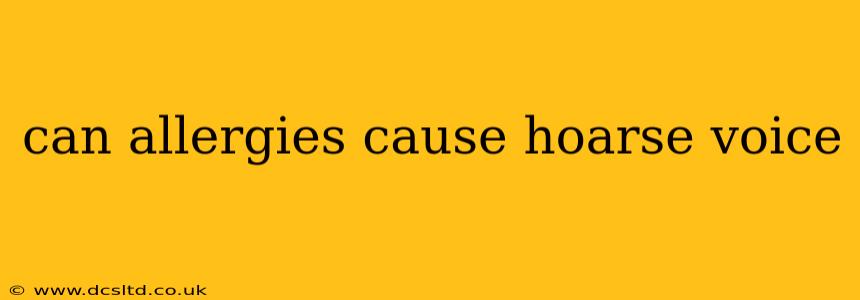Allergies are a common ailment affecting millions worldwide, triggering a cascade of symptoms ranging from sneezing and itchy eyes to more severe reactions. While the more typical allergy symptoms are well-known, many people wonder: can allergies cause a hoarse voice? The answer, in short, is yes, and this article will explore the intricate connection between allergies and vocal changes.
How Allergies Affect Your Voice
Allergies trigger an inflammatory response in your body. This response can manifest in various ways, and the vocal cords aren't immune. When you have allergies, your body releases histamine and other inflammatory chemicals. These chemicals can:
- Irritate the vocal cords: This irritation leads to swelling and inflammation of the delicate tissues of your larynx (voice box). Swelling makes the vocal cords vibrate differently, resulting in a hoarse, raspy, or strained voice.
- Increase mucus production: Allergies often lead to increased mucus production in the nasal passages and throat. This excess mucus can drip down the back of your throat (post-nasal drip), further irritating the vocal cords and causing hoarseness.
- Cause coughing: Allergic reactions frequently involve coughing, which can further strain the vocal cords and contribute to hoarseness. Persistent coughing can also lead to vocal cord damage over time.
What Other Symptoms Might Accompany a Hoarse Voice Due to Allergies?
A hoarse voice rarely appears in isolation when caused by allergies. You're likely to experience a cluster of symptoms, including:
- Runny nose: This is a hallmark symptom of allergic rhinitis (hay fever).
- Sneezing: Frequent sneezing is another common allergic response.
- Itchy eyes, nose, and throat: The inflammatory response often causes intense itching.
- Nasal congestion: Swelling in the nasal passages can lead to difficulty breathing through your nose.
- Watery eyes: This is a classic allergy symptom.
- Post-nasal drip: The excessive mucus drains into the throat, causing irritation and potentially a cough.
How Long Does Allergy-Induced Hoarseness Last?
The duration of hoarseness caused by allergies varies depending on the severity of the allergic reaction and the individual's response to treatment. In most cases, hoarseness will resolve once the allergic symptoms are controlled. If your allergies are well-managed with medication, the hoarseness should subside within a few days. However, persistent or worsening hoarseness warrants a visit to a doctor to rule out other causes.
How can I treat allergy-induced hoarseness?
Managing your allergies is key to relieving hoarseness. This usually involves:
- Allergy medication: Over-the-counter antihistamines and decongestants can help reduce inflammation and mucus production. Your doctor may prescribe stronger medications if needed.
- Hydration: Drinking plenty of fluids helps thin mucus and keep your throat moist.
- Rest your voice: Avoid excessive talking or shouting to prevent further strain on your vocal cords.
- Humidifier: Using a humidifier can add moisture to the air, helping to soothe irritated vocal cords.
- Avoid irritants: Stay away from smoke, dust, and other environmental triggers that can worsen your allergies and vocal irritation.
Can Allergies Cause a Permanent Hoarse Voice?
While generally not permanent, untreated or severe allergic reactions can potentially lead to long-term vocal problems if the inflammation persists. Chronic irritation and strain on the vocal cords can contribute to vocal cord nodules or polyps, which may require medical intervention. Therefore, it's crucial to manage your allergies effectively.
When Should I See a Doctor About a Hoarse Voice?
Consult a doctor if your hoarseness:
- Lasts longer than two weeks.
- Is accompanied by pain or difficulty swallowing.
- Is accompanied by a fever or other concerning symptoms.
- Is accompanied by significant breathing difficulties.
- Gets progressively worse despite allergy treatment.
In conclusion, allergies can indeed cause a hoarse voice due to inflammation and irritation of the vocal cords. Managing your allergies effectively through medication, hydration, and vocal rest is crucial in preventing prolonged hoarseness and potential long-term vocal damage. Always consult a healthcare professional if you experience persistent or concerning symptoms.
